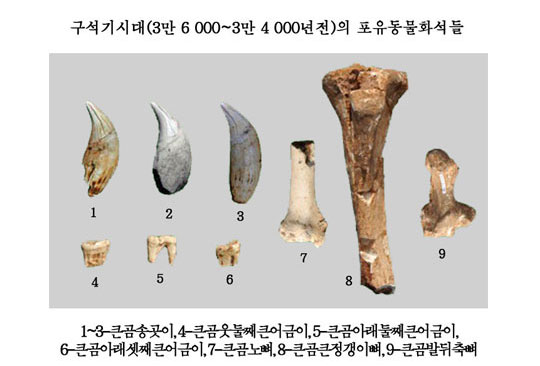Primitive cave site newly excavated in Hyangmok-ri, Kangdong County, Pyongyang
Recently primitive cave site, which the cultural layers of Paleolithic age, Neolithic age and Bronze Age are laid one after another, has been newly excavated in Hyangmok-ri, Kangdong County, Pyongyang.
Upholding the party’s will to excavate more superior national cultural heritage of our country, the research group of History Faculty in
During the research, they excavated 1,650 fossils of mammals (fossil bones of animals) of 9 kinds, 16 stone implements of 8 kinds and 280 fossils of spore and pollen in the 4th and 5th cultural layers of Paleolithic Age. In the 6th cultural layer of the Neolithic Age, they excavated 5 teeth of an Ancient Korean and 40 scraps of earthenware. In the 7th cultural layer of the Bronze Age, they excavated over 10 scraps of earthenware.
The researchers proved that this site was formed 36,000~34,000 years ago at the late period of the Paleolithic Age by electron paramagnetic resonance date measurement and thermal fluorescence date measurement.
They also clarified that the stone implements excavated here were the working implements which had been widely used in the late period of the Paleolithic Age through the study on the type, material and manufacturing method of the stone implements.
They also clarified that the teeth of the Ancient Korean excavated in the cultural layer of Paleolithic Age were the teeth of a woman in her fifties and the scraps of earthenware excavated in the cultural layer of the Neolithic Age and the Bronze Age were the relics of the period of Neolithic Age and the Bronze Age through the analysis of the shape, colour and pattern.
Archaeological society and non-permanent tangible cultural heritage evaluation committee of DPR Korea have examined the excavation and research result of the site and registered Hyangmok-ri cave site in Kangdong County, Pyongyang as national treasure relics.
In the past, many remains of Neolithic age have been excavated in Kangdong area which proved that the social and historical preconditions were ripe for the state foundation. However, the remains and relics of the Paleolithic Age, the dawn of the history of mankind, were not found.
This time, it was scientifically proved by the excavation of the Hyangmok-ri cave site that the area of Kangdong County where Tangun, the founding father of our nation, lie in his grave is the place where the human beings were born and lived from the Paleolithic Age and the area of Kangdong County is one of the areas where the modern Korean people took historical root.
This has a great significance in scientifically clarifying the social relationship, creative activity and time-honouredness of our nation with more abundant data and in clarifying the lawful course of the human evolution.
※ For more detailed photographs, please refer to the national heritage list of this homepage.
